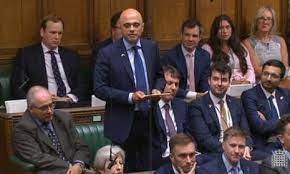Five years ago, government officials were ready to provide a pathway to exoneration for thousands of international students who may have been falsely accused of academic dishonesty.
However, their plans were thwarted by a sudden cabinet reshuffle, according to sources.
Sajid Javid, a former Home Secretary, had instructed officials to create a streamlined process for students who believed their visas were wrongly canceled due to allegations of cheating to have their cases reviewed internally, sources have disclosed.
In July 2019, a solution for the 35,000 students affected by the Home Office’s blanket visa cancellation was in the works, but it was pending approval from Downing Street.
However, the change in leadership, with Boris Johnson replacing Theresa May as prime minister and Priti Patel taking over as home secretary, led to the proposals being put on hold.
As students persist in their efforts to clear their names, new information has surfaced about the government’s near success in resolving the long-standing immigration controversy.
This issue dates back to a decade when numerous students were unjustly expelled from their courses.
In 2014, a BBC documentary exposed rampant cheating at test centers that international students were required to visit to renew their visas.
Consequently, the Home Office canceled the visas of around 35,000 students, declaring them ineligible to continue their studies in the UK, leaving them with no choice but to forfeit thousands of pounds in fees.
2,500 students were deported, while 7,200 others opted to leave the country after being informed that they would be subject to arrest and detention if they remained in the UK.
In the last decade, many people have sought legal recourse through immigration courts to challenge the revocation of their visas by the Home Office, intending to resume their studies in the UK.
Despite the significant expenses and time involved, appeals have been successful for at least 3,700 individuals.
In 2019, the department’s permanent secretary at the time, Philip Rutnam, informed Members of Parliament that officials were cognizant of the potential mistreatment of individuals throughout the process.
He expressed genuine concern over the ongoing protests of innocence by some individuals, suggesting that the existence of such protests warranted attention and further examination.
Plan To Review Administrative Processes

On 23rd July 2019, Javid informed Members of Parliament through a written statement that he was aware of the unjust accusations made against some students.
“There have remained concerns that some people who did not cheat may have been caught up and I am aware that some people found it hard to challenge the accusations against them,” he wrote.
In a bid to address concerns of unfair treatment, Javid proposed expediting an internal administrative review process.
This simplified approach would allow individuals to request the Home Office to reexamine their cases, offering an alternative to costly appeals through an immigration tribunal
The following day, before any further announcements could be made, a new government assumed power, replacing the May administration.
Subsequently, the newly appointed prime minister assigned Javid to a different role, making him the Chancellor of the Exchequer.
Officials at the Home Office knew it would be complex and expensive to introduce an internal administrative review, but had been under instructions from Javid to find a way to make it work.
“The process came very close to being introduced when there was a home secretary who was sympathetic, but then there was a change of government with different priorities. No one was very keen on the idea,” a source said.
READ ALSO: Thailand’s Ex-PM Thaksin Shinawatra Set For Release





















